Profile: Hannah Farley
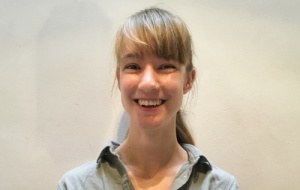
Hannah Farley (2012, DPhil Medicine)
Hannah Farley, Junior Dean and DPhil student, is the subject of our second interview celebrating 40 years of women at Univ.
Have you always been set on studying Medicine, or did you take a while to decide? What helped you come to a decision?This sounds cheesy, but the first thing I remember deciding was that I wanted to help people. That was a big driver when I started looking into potential career options. As science became more interesting throughout secondary school, medicine came to the forefront. I liked the idea of a hands-on and dynamic career, and didn’t want to be sat at a desk for long periods of time.
Why did you choose Oxford? What made you choose Univ?
I liked the more traditional course structure at Oxford, with its clear-cut pre-clinical and clinical years. The most unique part of being a doctor, as opposed being another member of the multi-disciplinary health care team, is mostly about diagnostics – doctors are meant to know the underlying science well enough to interpret patient history, symptoms and test results to determine what is wrong, and how best to treat it. So to me, it made sense to get a thorough grounding in the science. More to the point, I enjoy studying the life sciences, so that aspect of the course was never really a negative for me. As for Univ, this is maybe the biggest cliché ever, but I walked through the doors on a rainy day when I first visited Oxford, and it felt like home. The unofficial prospectus was helpful too, and I felt like it offered a good insight into student life here.
Was there a particular area of your subject that you were interested in before you applied? How did you explore that area further?
With hindsight, genetics has always been the area of medicine that has interested me the most. I did a lot of reading before applying. There are lots of good popular science books out there, and if you hit a topic that you are genuinely interested in, it doesn’t feel like additional academic work.
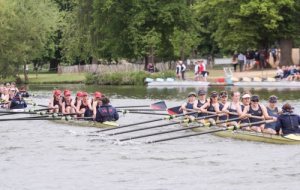
Univ W1 bumping Balliol W1 at Summer Eights 2015
How do you think you have changed since walking through Univ’s doors as a fresher?
It feels like a very long time ago that I first came to Univ. The biggest thing is that I feel more sure of myself – taking time out of my medical degree to do a DPhil was quite a swerve, and was by no means an obvious path to follow.
What else do you do apart from your subject in Oxford? How have you found coordinating all your extracurricular activities with your studies?
The two main things I do outside of my studies are running a Girlguiding Ranger unit (for girls aged 14-18 in north Oxford) and rowing for the college boat club. Coordinating everything can be a challenge, but it is definitely worth it. Time management and prioritisation are key, as is knowing your limits. I rowed for the University lightweight women’s squad when I was an undergraduate. This taught me a lot, but I gave it up when I started my graduate studies as my mental health wasn’t coping. It was a tough decision but was ultimately the right thing to do for me.
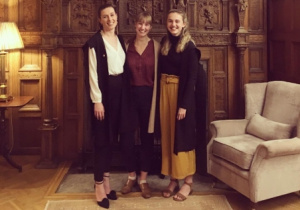
Junior Deans Formal
What is it like being a Junior Dean?
It’s nice to be properly involved in college life again – lots of upper year DPhil students live out of college, so that sense of community isn’t as strong. Occasionally helping close bops and parties isn’t massively fun, but it’s about maintaining a respectful environment for the college and its community, especially as we come up to examinations.
Has anything surprised you about Univ or Oxford?
I guess the most surprising thing is that I’m doing a DPhil, as I never thought that would happen! More generally, I didn’t think the tutors would be that supportive. I think the sense of belonging that develops around Univ is also unexpected – it tends to be a bit intimidating the first time you eat dinner in hall, but soon it’s second nature to stand up when someone bangs a gavel at the end of formal
Have you faced any challenges in your time at Univ? How did you overcome them?
As I’ve already touched on, my main challenge in my time here has been mental health issues. I had depression on and off throughout my undergraduate degree, and finally got the help I needed in the first year of my DPhil. Everyone’s experience with mental health is different, but something that seems pretty undeniable is that having difficulties with your mental health is fairly common at university, and particularly at Oxford. I couldn’t have overcome my own issues without my friends and family, the University counselling service, and the College doctors.
How do you feel about the celebration of 40 years of women at Univ?
It’s always helpful to reflect on our past and how far we have come. I appreciated the exhibition on women at Univ from 1249 – 2019 that Dr Laura Varnam, College Archivist Robin Darwall-Smith, and College Librarian Elizabeth Adams have put together, and I think it’s important to remember that even if women have only been admitted as students for 40 years, they have been involved in the wider Univ community since its inception.
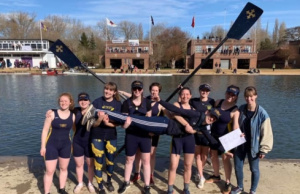
Univ W3, Torpids 2019. Hannah coached them and they won blades.
I think there is still a way to go in Oxford and the world – the gender balance of Fellows at Univ, for example is not exactly 50/50. As well as this, it isn’t enough just to have women at the table – I think the work of Kimberlé Crenshaw on intersectionality is really important when considering access to higher education, and particularly postgraduate education and academia.
Positive steps are definitely being taken. For example, Oxford is starting UNIQ+, which is a graduate version of UNIQ, the highly successful summer school programme, with the aim of widening access to graduate study.
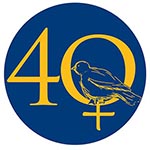 Women at Univ 2019. Celebrating 40 years of achievement by women students, academics and staff, and recovering the history of women in the College from 1249 to the present day.
Women at Univ 2019. Celebrating 40 years of achievement by women students, academics and staff, and recovering the history of women in the College from 1249 to the present day.
Published: 15 March 2019
